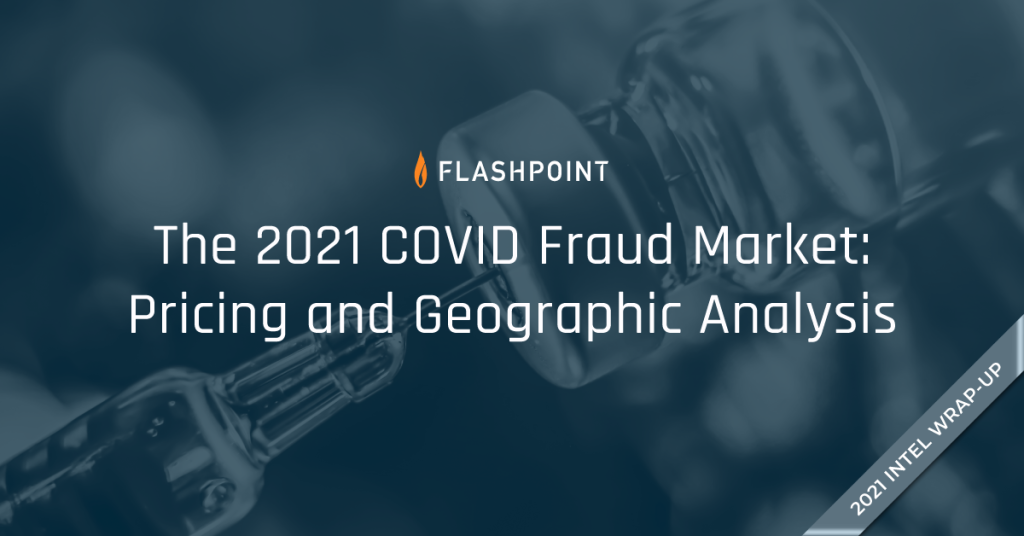Blog
2021 Intel Wrap-Up: COVID-19 Fraud By The Numbers—Pricing and Geographic Analysis
This year, much like it did for the majority of last year, the COVID-19 pandemic dominated our daily lives. The main difference between 2021 and 2020, of course, is the approval and rapid distribution of three vaccines in the US, resulting in the inoculation of more than 200 million Americans (as of this publishing). In the US, those who received vaccinations were provided paper proof—vaccine cards on which records are written in ink.

The following is part of Flashpoint’s 2021 Intel Wrap-Up series.
This year, much like it did for the majority of last year, the COVID-19 pandemic dominated our daily lives. The main difference between 2021 and 2020, of course, is the approval and rapid distribution of three vaccines in the US, resulting in the inoculation of more than 200 million Americans (as of this publishing). In the US, those who received vaccinations were provided paper proof—vaccine cards on which records are written in ink.
However, millions of Americans remain unvaccinated, as do many, many more worldwide. And, due to a range of restrictions and regulations (such as employee vaccine mandates, proof of vaccine for indoor dining and social activities, etc.), an illicit COVID-19 market has emerged.
Most notably, Flashpoint has observed the rapid establishment of markets where threat actors advertise vaccine doses themselves as well as the vaccine cards for a variety of vaccine providers, demonstrating the low barrier to entry for threat actors and scammers alike.
Related reading: This Is What COVID Fraud Looks Like
This burgeoning black market raises a number of issues for healthcare organizations and government agencies. Where are threat actors getting the “cures” they advertise, and how might this be affecting the vaccine supply chain? How should organizations go about checking the veracity of these offerings at scale? What are the potential health risks from untrusted “vaccine” sources? What does the overall market data look like in terms of offerings, location, and pricing?
These are important questions in order to help avert vaccine-related fraud, and the health and safety impacts that this fraud causes. To support security and health professionals getting to the bottom of these issues, Flashpoint has analyzed its vast collections of data on vaccine fraud, and identified trends and metrics from vaccine and vaccine card markets.
Specifically, the visual below focuses on fraud associated with the three primary vaccine types in the US (Pfizer-BioNTech, Janssen (Johnson and Johnson), and Moderna), and identifies pricing, prevalence, and sources for fraudulent vaccines and cards.

Related reading: Considerations for Updating Near-Term Intelligence Requirements in Response to COVID-19
As the global pandemic continues, vaccine cards demonstrate the low barrier and cost of producing and selling fraudulent vaccine documentation. And as restrictions progressively loosen, businesses should be aware of potential risks of fake vaccine cards, which we have highlighted by region above. This information, along with other illicit offerings, accentuates the need for organizations to implement further verification procedures and other protective measures that can proactively prevent future potential compromise.
To learn more about Flashpoint’s data collections and security solutions for the healthcare and public sector, sign up for a demo or free trial.

